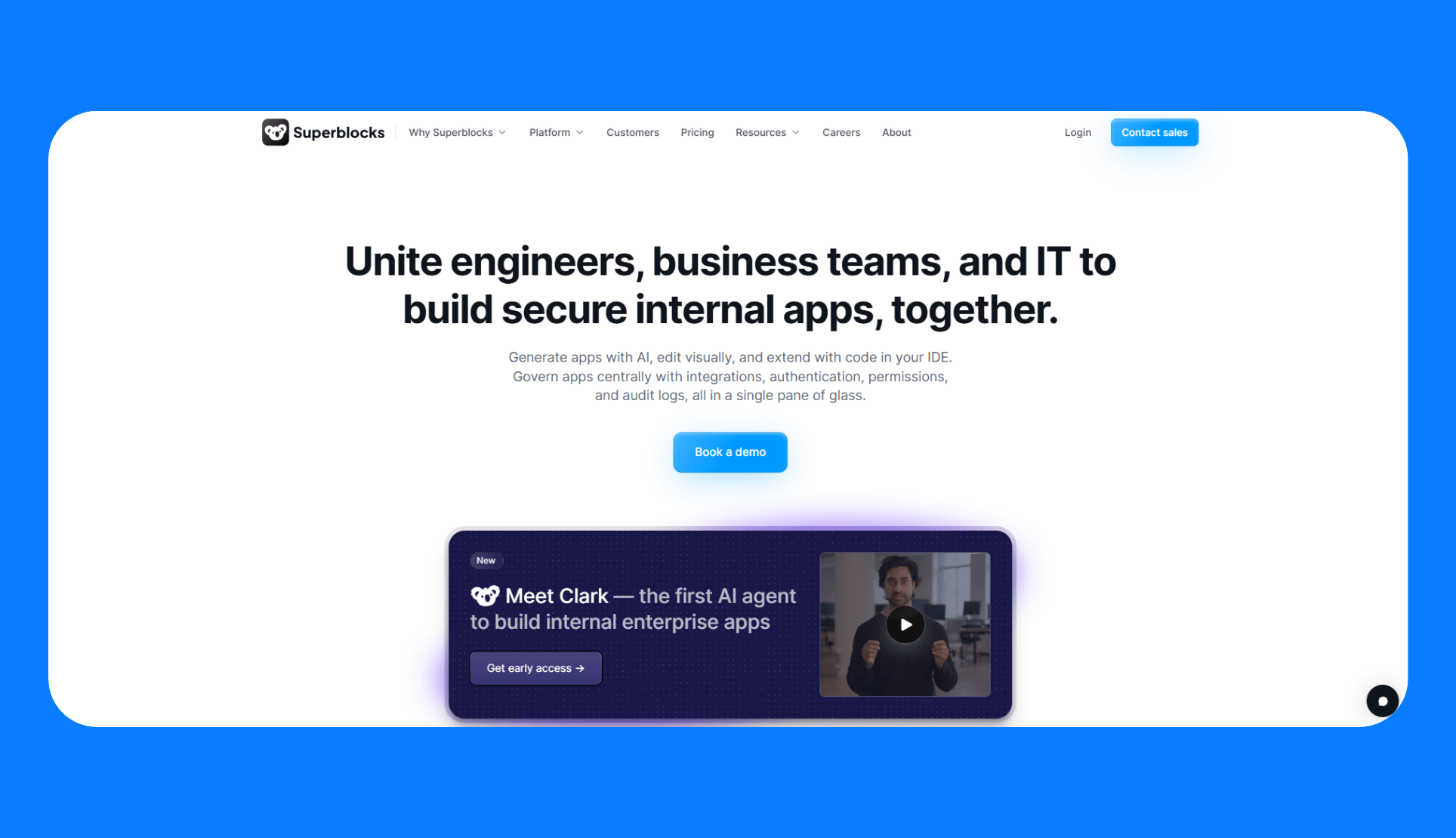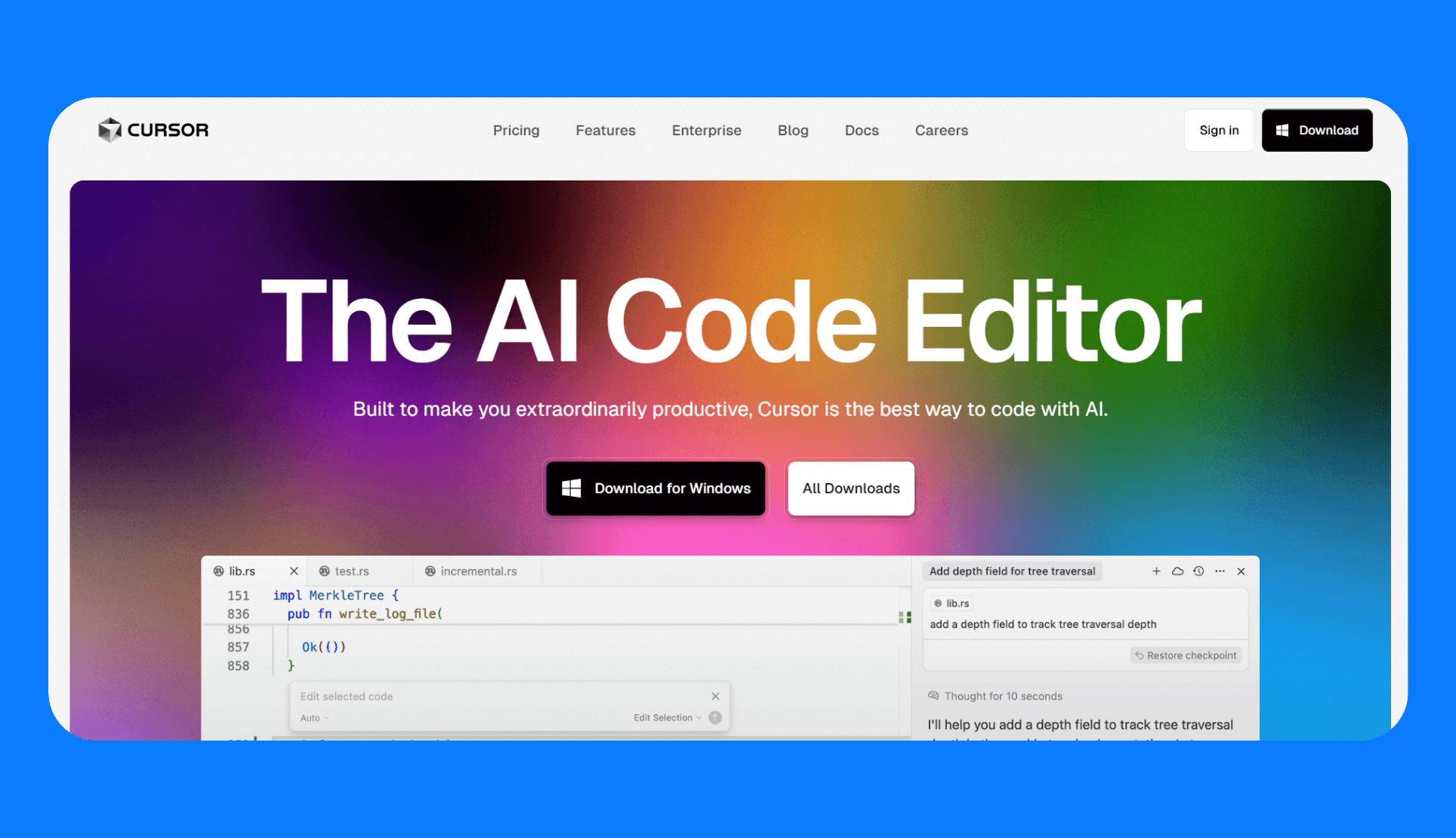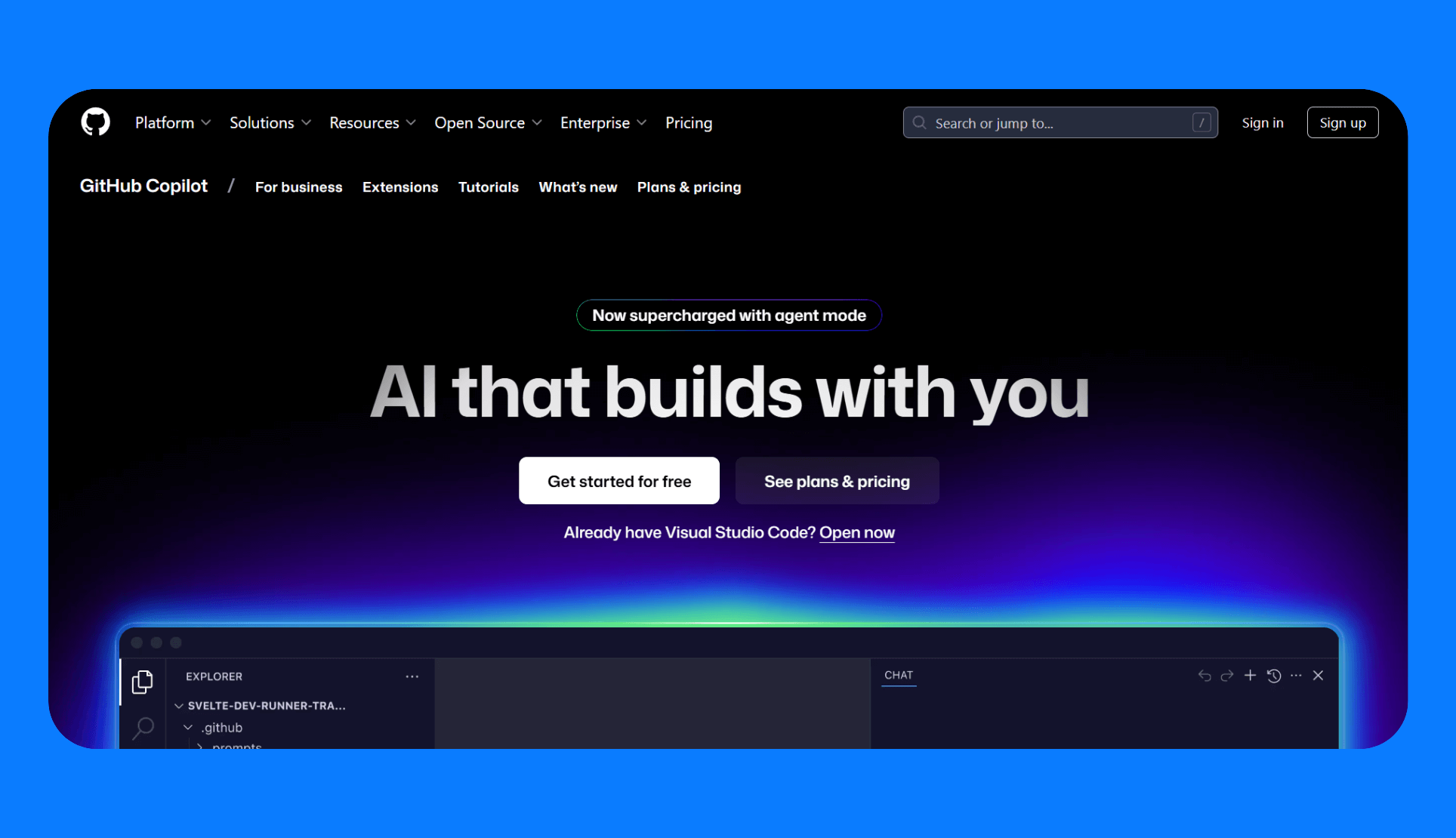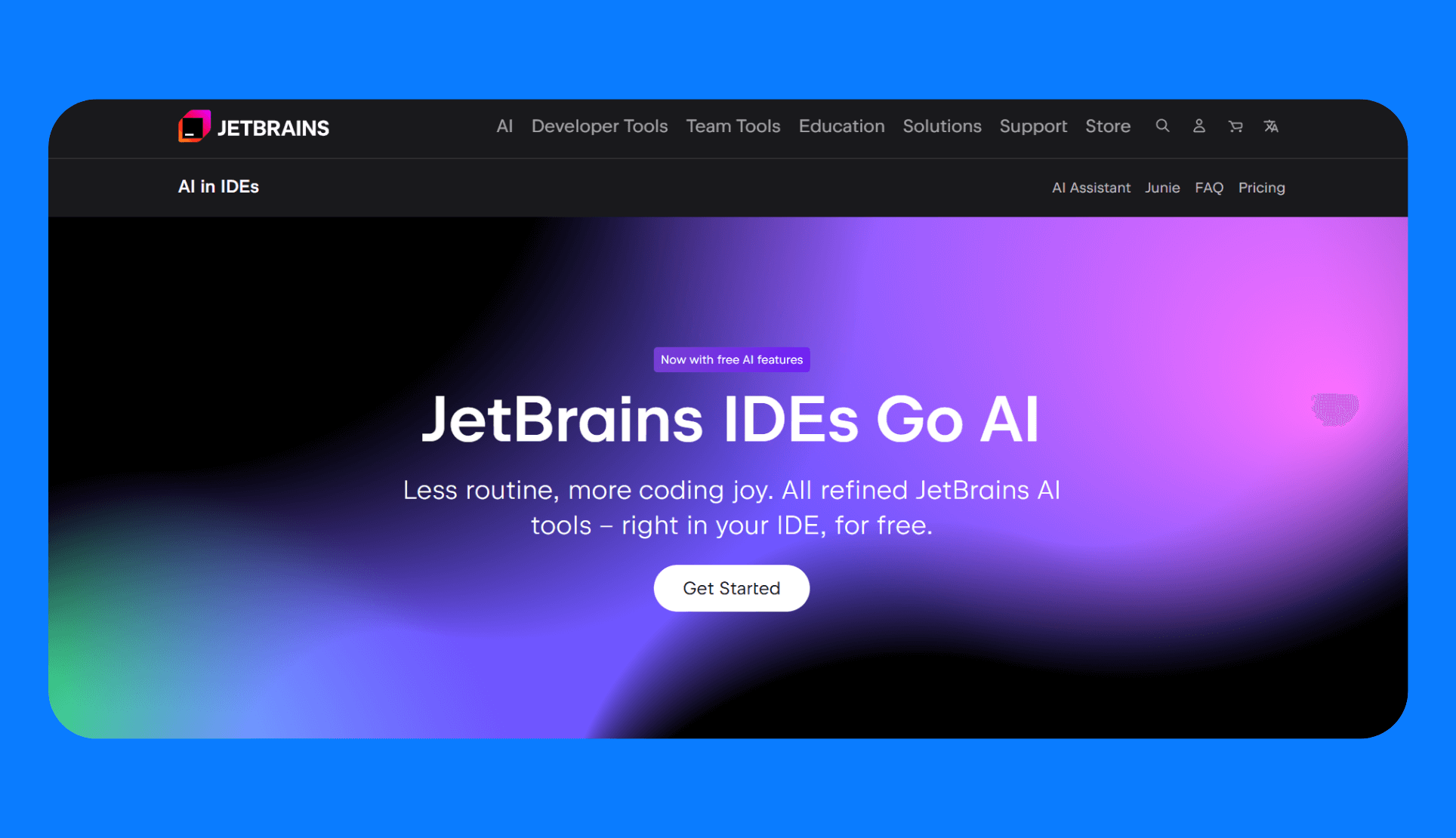


Windsurf by Cognition is one of the most popular AI coding assistants in 2025. It comes as a standalone editor and plugin you can use in your existing IDEs. But it’s not the only option for developers.
AI code editors like Cursor, terminal tools like Claude Code, and AI-native platforms like Superblocks are other tools worth exploring.
In this article, we’ll cover:
- The 7 best Windsurf alternatives
- How each compares in speed, features, and security
- Which tools fit different developer needs
7 best Windsurf alternatives: TL;DR
Before we go into details, here’s a quick side-by-side comparison of Windsurf alternatives:
1. Superblocks

Superblocks is an AI-native enterprise app platform for building production-grade internal apps fast. It reduces shadow IT and engineering bottlenecks by combining AI, visual, and code-based development in a centrally governed environment. This lets semi-technical teams build apps securely.
Engineering and business teams can work together on the same platform. IT manages governance (e.g., RBAC, SSO), audit logs, integrations, and more from a single pane of glass.
Advantages over Windsurf
- Multi-modal development: Superblocks lets you generate apps with AI from natural language prompts, build visually in a full WYSIWYG editor, or extend in code directly in your preferred IDE (including Windsurf) with live two-way sync.
- Centralized governance: It enforces enterprise-grade governance with RBAC, SSO, SCIM, and audit logs.
- Extensive integrations: Superblocks connects to any API or database (REST, gRPC, GraphQL, OpenAPI). It also integrates with Git-based workflows, CI/CD pipelines, and other SDLC processes.
- AI guardrails: Teams can customize prompts, sanitize prompts, and validate AI-generated code before deployment.
- Forward-deployed engineers: Dedicated field engineers work directly with teams to speed implementation and reduce time to first application.
Pricing
Superblocks customizes pricing based on the number of builders, internal and external users, and deployment model.
Verdict
Superblocks reduces the complexity, overhead, and risk of building and maintaining internal apps. Use it to democratize development safely across the org without compromising your org’s standards or compliance.
2. Cursor

Cursor is an AI code editor that combines conversational coding assistance. It also has an agent mode for handling multi-step tasks. Developers can interact with it like a traditional coding assistant or enable the agent to plan, apply, and verify code changes across a project.
Advantages over Windsurf
- Dual AI modes: Cursor provides quick conversational help and an agent mode for automated multi-step tasks such as multi-file refactors.
- MCP integration: The Model Context Protocol (MCP) lets you extend the agent’s capabilities by connecting to external data sources and tools through standardized interfaces.
- Composer for refactoring: The Composer feature organizes and executes multi-file edits, presents diffs for review before applying changes.
- VS Code compatibility: The IDE supports existing VS Code extensions, settings, and key bindings so developers can keep their existing workflows without reconfiguration.
Pricing
Cursor uses a subscription model with both free and paid tiers. The free tier includes limited AI completions and agent requests. Paid plans start at $20 per month for the Pro plan, which offers unlimited Tab completions and $20 of frontier model usage per month at API pricing.
Verdict
Developers who want a familiar in-IDE repo-aware coding assistance should consider Cursor.
3. VS Code

Visual Studio Code (VS Code) is the most widely used code editor in the world. It’s open source, lightweight, and packed with extensions that let developers tailor it to any workflow.
Advantages over Windsurf
- Ecosystem depth: VS Code has an enormous extension marketplace with thousands of integrations covering frameworks, languages, testing, and deployment.
- AI assistant support: Developers can add AI copilots directly into VS Code through extensions like GitHub Copilot, Claude, and even Windsurf.
- Community and support: VS Code’s huge community means lots of tutorials or plugins to solve almost any problem.
- Cross-platform: It works across macOS, Windows, and Linux.
Pricing
VS Code is free to use. AI assistants like GitHub Copilot or third-party integrations may require separate subscriptions.
Verdict
Use VS Code if you want a proven, extensible, and cost-effective editor with the flexibility to plug in AI assistants of your choice.
4. Claude Code

Claude Code is Anthropic’s official command-line AI coding assistant. It understands large codebases and runs agentic workflows from your terminal.
Advantages over Windsurf
- Terminal-first: Claude Code runs natively in your terminal. It extends AI coding beyond IDEs into batch and system-level tasks.
- Agentic execution: It can plan and apply multi-step tasks such as editing files, running tests, committing changes, or creating pull requests with explicit approval.
- Extensible architecture: It uses MCP to integrate with tools like Slack, Google Drive, and Jira. This enables workflow automation directly from the CLI.
Pricing
Claude Code is included in the Claude Pro plan at $17/month, which provides access to the Sonnet 4 model. The Opus 4.1 model is available under Claude’s Max plans. Teams and enterprises can use Claude Code through Anthropic’s API on a pay-as-you-go basis.
Verdict
Claude Code works best for developers and teams who prefer working in the terminal and need AI that acts autonomously and contextually within your toolchain.
5. GitHub Copilot

GitHub Copilot is an AI assistant that integrates into IDEs like Visual Studio Code, Visual Studio, Neovim, and JetBrains. It offers inline code completions, natural language prompt handling, and chat-based help embedded in your development environment.
Advantages over Windsurf
- Multi-model support: It allows selection among LLMs like GPT‑4, Claude, Gemini, and more to suit coding tasks.
- Copilot chat: Available in paid tiers, this feature enables interactive code assistance, including explanations, debugging help, and problem-solving via chat.
- Prompt to app builder: The Pro+ plans give users access to GitHub Spark, a tool that generates apps from natural language prompts.
Pricing
GitHub Copilot is free for up to 2,000 completions and 50 chat messages per month for individual use. Paid plans start at $10/month, or $100/year for individual users and $19/user/month for business users.
Verdict
GitHub Copilot fits developers who prefer a native, model-flexible AI assistant embedded directly in their workflow. Copilot, however, has narrower context awareness compared to platforms designed for full-project reasoning like Claude Code.
6. JetBrains IDEs with AI

JetBrains offers a lineup of language-specific IDEs such as IntelliJ IDEA, PyCharm, WebStorm, GoLand, CLion, Android Studio, and more. Each IDE includes the AI-assisted features and the autonomous agent Junie, which extend traditional IntelliSense with LLM-powered completions, refactoring, and debugging help.
Advantages over Windsurf
- Language-specific IDEs: JetBrains IDEs are tailored to specific ecosystems (Java, Python, JavaScript, Go, etc.) with dedicated tooling and debugging features.
- Local model options: JetBrains allows you to run local models, which can be useful for privacy and compliance.
- Flexible model choice: JetBrains supports OpenAI, Google Gemini, Anthropic, and its own Mellum model.
Pricing
The free tier includes unlimited code completion, local AI support, and 3 AI credits. Paid plans start at $10/month for individuals, which adds 10 AI credits and limited Junie agent usage. Organization plans start at $20/user/month and include 20 AI credits along with limited Junie agent usage.
Verdict
Use JetBrains AI if you are already using one of the JetBrains IDEs and need strong language-specific tooling or the option to run AI locally.
7. Zed

Zed is an open-source, high-performance code editor built in Rust. It offers real-time multiplayer collaboration, native Git support, AI-assisted features, and a minimalist interface optimized for speed and responsiveness. It runs on macOS and Linux, with Windows support currently in beta.
Advantages over Windsurf
- Performance-first architecture: Written in Rust, Zed uses multi-core CPU and GPU acceleration for minimal latency and high-speed responsiveness.
- Real-time collaboration: Multiplayer editing lets teams co-edit files, chat, share screens, and annotate code live inside the editor.
- Agentic AI features: Includes an Agent Panel and inline code transformation. Slash commands let you bring in tabs, files, diagnostics, or terminal output as context for high-transparency AI interaction.
Pricing
Using your own API keys is free on all plans. You pay model providers directly. It has a free plan that includes 50 Zed-hosted AI prompts/month and 2,000 edit predictions. Paid plans start at $20/month for up to 500 prompts.
Verdict
If you need speed, collaborative editing, and agentic AI inside a modern editor, consider using Zed. However, keep in mind that Windows support is not publicly available yet.
How we chose the best Windsurf alternatives
Our selection focused on platforms that address Windsurf's gaps in enterprise governance, deployment flexibility, and team collaboration.
Top criteria we considered:
- Team-based security and auditability: Support for RBAC, SSO, SCIM, and audit logs.
- Extensibility and integrations: Compatibility with APIs, Git workflows, IDEs, and external collaboration tools.
- AI execution style: Options for agentic workflows, conversational assistance, or hybrid modes.
- Deployment flexibility: Cloud, hybrid, or on-premises options.
- Prompt traceability: Ability to review and verify AI-generated code before applying changes.
- Git-native workflows: Integration with pull requests, version control, and CI/CD pipelines.
Which alternative should you choose?
The right Windsurf alternative depends on your development workflow, priorities, and environment.
To put it broadly:
- Superblocks suits teams building internal tools with AI that must meet strict governance and security requirements.
- VS Code, JetBrains IDE, Cursor, and GitHub Copilot fit developers who want AI assistance inside a familiar IDE environment.
- Claude Code works well for developers who prefer terminal-based workflows and direct command-line execution.
- Zed is a good fit for teams that want an open-source, local-first agent they can customize to their own AI models.
Build secure, governed internal tooling with Superblocks
All the tools in this list speed up code-centric workflows with AI. However, if you're building internal tools and not everyone in your team writes code or wants to, consider using Superblocks.
Superblocks supports AI, visual, and code-based building in a centrally managed platform. It also allies business and engineering teams to deliver secure, compliant applications while IT gets unified visibility.
Let’s recap the key capabilities that enable this:
- Flexible development modalities: They can use Clark, the AI agent, to generate apps from prompts, the WYSIWYG drag-and-drop editor, or code. The live 2-way sync between your code and visual editor makes sure you don’t lose context when you switch modes.
- Context-aware AI app generation: Every app built on Superblocks abides by organizational standards for data security, permissions, and compliance. This addresses the major LLM risks of ungoverned shadow AI app generation.
- Centrally managed governance layer: Superblocks supports granular access controls with RBAC, SSO, and audit logs, all centrally governed from a single pane of glass across all users. You can integrate with secret managers for safe credentials management.
- Keep data on-prem: You can deploy the on-prem agent within your VPC to keep sensitive data in-network.
- Extensive integrations: It can integrate with any API or database. These integrations include your SDLC processes, like Git workflows and CI/CD pipelines.
- AI app generation guardrails: You can customize prompts and set LLMs to follow your design systems and best practices.
Ready to build securely with AI? Book a free demo with one of our product experts.
Frequently asked questions
What’s the best Windsurf alternative for large dev teams?
The best Windsurf alternative for large dev teams is Superblocks. It combines AI-powered development with enterprise-grade governance, centralized control, and flexible deployment options that scale across organizations.
How does Superblocks compare to Windsurf?
Superblocks uses a different development approach compared to Windsurf. It democratizes app development for entire organizations, while Windsurf helps individual developers write code faster.
What makes an AI dev tool “enterprise-ready”?
An AI dev tool becomes enterprise-ready when it includes security controls like audit logging, RBAC, and SSO integration. It should also be able to enforce consistent standards across all development.
Which tool supports local or on-prem LLMs?
Zed and JetBrains AI support local or on-prem LLMs. They both don’t charge you platform fees when you use your own models.
Do these tools allow audit logging and RBAC?
It depends on the tool. Superblocks provides audit logging and granular RBAC, tracking every user action from data access to deployments.
Is Windsurf worth it for internal tools teams?
Windsurf is not worth it for internal tools teams if governance and compliance are top priorities. Superblocks offers the same AI support while also enabling organizations to build internal tools in a standardized environment that they can centrally govern.
Stay tuned for updates
Get the latest Superblocks news and internal tooling market insights.
You've successfully signed up
Request early access
Step 1 of 2
Request early access
Step 2 of 2
You’ve been added to the waitlist!
Book a demo to skip the waitlist
Thank you for your interest!
A member of our team will be in touch soon to schedule a demo.
Table of Contents



.png)
%20(1).png)
.png)
